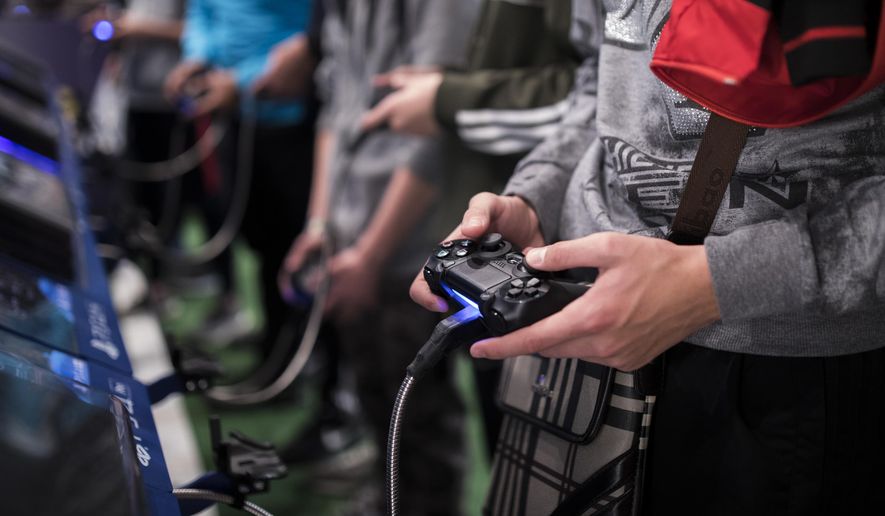The World Health Organization said Monday it plans to classify compulsive video-game playing as an addictive disorder, saying while sessions of “Fortnite” or “Candy Crush Saga” can be simple pleasures for some, they’ve reached serious, life-disrupting levels among a sliver of the gaming community.
WHO, the public health arm of the United Nations, said it conducted a full review of global evidence before including “gaming disorder” in a draft version of its latest international classification of diseases, or ICD — a set of 55,000 unique codes that help doctors diagnose conditions and serve as a foundation for health insurance billing.
“It’s a good move. It gives legitimacy to a disorder that we have been seeing in our practices,” said Dr. Petros Levounis, a psychiatry professor at Rutgers New Jersey Medical School. “It opens the door for proper reimbursement for gaming disorder.”
WHO said it isn’t talking about kids who waste time after school on smartphones or video-game consoles.
Rather, this is about people who allow gaming to take increasing priority over things like sleeping, eating, doing homework, attending class or going to work.
“All of this has serious negative consequences over a person’s health as well as overall functioning,” said Dr. Shekhar Saxena, director of WHO’s Department for Mental Health and Substance Abuse.
“Countries and professionals need to be aware [of this],” he said, “and should be able to look out for this and provide prevention and treatment.”
While gaming disorder may afflict people of any age, it’s more likely to be found among young adults and adolescents, according to the WHO, which also said the disorder should be evident over the course of a full year to warrant a diagnosis.
Mark Griffiths, a psychology professor at Nottingham Trent University in the U.K., said the decision will put a label on the problem and give sufferers a better shot at treatment, after years of academic research.
“This has not been a decision that’s been taken lightly,” said Dr. Griffiths, who’s studied the topic for about 30 years.
He said the idea that researchers like himself are “anti-gaming” is “rubbish.”
He estimated that only 1 to 4 percent of gamers are at risk of addiction, while fewer than 1 percent have a diagnosable disorder.
For example, he pointed to a case study involving a 38-year-old man who lost his wife, children and job because he spent so much time playing EverQuest, an online multiplayer game. As his life took a downward turn, he coped by playing the game even more.
“The only thing this guy was doing, apparently apart from sleeping, was playing the game,” Dr. Griffiths said. “We’re talking about an activity that completely compromises your personal relationships.”
It’s unclear how quickly the medical community will adapt to international recognition of gaming disorder. Government-run health systems in Europe will put gaming disorder on the “bottom of the list” of things to be covered, versus things like cancer, while private insurers in countries like the U.S. may not want to cover it all, the professor said.
Insurers may be able to cover treatment for gamers who exhibit signs of another disorder, though whether to classify gaming addiction as its own disorder has divided the medical community.
The American Psychiatric Association did not include it in the last edition of its last manual of mental disorders, known as the DSM-5, in 2013, though it recognized the need for further research.
“The research and the debate are ongoing. Some argue, for example, that gaming could be a symptom of an underlying problem, such as depression or anxiety, and not a disorder or addiction itself,” an APA web page on the topic says.
The gaming industry opposed WHO’s move on Monday, saying it should reconsider before member states vote to adopt the new codes early next year.
“Experts worldwide are urging caution regarding the World Health Organization’s proposed ’gaming disorder’ as it may lead to misdiagnosis of real mental health conditions,” the Entertainment Software Association, a key lobby, said in a prepared statement. “There is no objective evidence to define and diagnose this disorder and the research supporting inclusion is highly contested and inconclusive.”
Dr. Levounis said while it is important not to “pathologize” every problem that comes along, compulsive gaming is on the rise and hard to ignore.
“This one has been exploding in front of our own eyes,” he said.
• Tom Howell Jr. can be reached at thowell@washingtontimes.com.




Please read our comment policy before commenting.